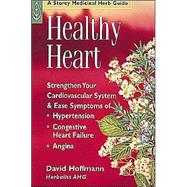
| Introduction: Why Use Herbal Remedies for Heart Health? | p. 1 |
| Minimizing Major Risk Factors | p. 8 |
| General Factors | p. 9 |
| Stress and Personality | p. 13 |
| Cholesterol | p. 14 |
| Dietary and Supplement Guidelines | p. 20 |
| Understanding How Herbs Work | p. 23 |
| Herbal Actions for the Heart and More | p. 23 |
| Cardiac Remedies | p. 26 |
| Diuretics | p. 30 |
| A Technical Discussion of Plant Constitutents | p. 36 |
| Overview of Cardiovascular Diseases | p. 43 |
| Hypertension (High Blood Pressure) | p. 43 |
| Arteriosclerosis | p. 55 |
| Congestive Heart Failure | p. 62 |
| Angina Pectoris | p. 66 |
| Intermittent Claudication | p. 69 |
| Poor Circulation | p. 71 |
| Varicose Veins | p. 73 |
| A Guide to the Healing Herbs | p. 78 |
| Arnica | |
| Bugleweed | |
| Cayenne | |
| Cleavers | |
| Coleus | |
| Corn | |
| Couchgrass | |
| Cramp Bark | |
| Dandelion | |
| Feverfew | |
| Figwort | |
| Garlic | |
| Gentian | |
| German Chamomile | |
| Ginger | |
| Ginkgo | |
| Hawthorn | |
| Horsechestnut | |
| Kava Kava | |
| Kola | |
| Lavender | |
| Lily of the Valley | |
| Linden | |
| Lobelia | |
| Ma Huang | |
| Milk Thistle | |
| Motherwort | |
| Night-Blooming Cereus | |
| Oats | |
| Parsley | |
| Passionflower | |
| Prickly Ash | |
| Rosemary | |
| Scots Broom | |
| Siberian Ginseng | |
| Skullcap | |
| St.-John's-Wort | |
| Valerian | |
| Wild Carrot | |
| Witch Hazel | |
| Wood Betony | |
| Yarrow | |
| Making Herbal Medicine | p. 109 |
| Teas | p. 110 |
| Tinctures | p. 113 |
| Dry Herb Preparations | p. 114 |
| Index | p. 116 |
| Table of Contents provided by Syndetics. All Rights Reserved. |
The New copy of this book will include any supplemental materials advertised. Please check the title of the book to determine if it should include any access cards, study guides, lab manuals, CDs, etc.
The Used, Rental and eBook copies of this book are not guaranteed to include any supplemental materials. Typically, only the book itself is included. This is true even if the title states it includes any access cards, study guides, lab manuals, CDs, etc.
Excerpted from Healthy Heart: Strengthen Your Cardiovascular System Naturally by David Hoffman
All rights reserved by the original copyright owners. Excerpts are provided for display purposes only and may not be reproduced, reprinted or distributed without the written permission of the publisher.